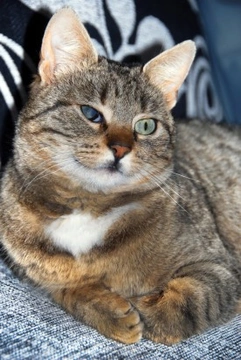
Blindness in cats
Complete blindness in cats is relatively uncommon, however, some cats, particularly as they enter old age, may potentially suffer from a range of problems with their vision and eyes, which can lead to total or partial blindness. Sometimes blindness in cats is temporary or reversible, although this may not always be the case. Cats that are born blind or that lose their eyesight gradually over time generally cope surprisingly well despite the lack of one of their senses, and are able to compensate for the problems that blindness can cause by relying on their remaining senses that much more.If you suspect that your cat’s eyesight might be failing, or are wondering how viable it is to look after a blind cat, read on to find out more about blindness in cats and how to manage it.
Common causes of blindness in cats
There are many potential problems and conditions that can lead to blindness in cats, and most of these conditions are progressive and will develop gradually over time. Elderly cats are more likely to suffer from failing vision than their younger counterparts, although cats of any age may suffer from vision problems and conditions of the eye that can lead to blindness. Some of the most common causes of blindness in cats include:
- Glaucoma, a condition that causes a build-up of pressure in the eyes due to an inherited condition, illness or injury.
- Cataracts, an opacity over the surface of one or both eyes that can be caused by an injury, an inherited condition or diabetes.
- Injuries that cause damage to one or both eyes.
- Tumours and masses around or in the eyes.
- Detachment of the eye’s retina, which can be caused by high blood pressure and is often related to thyroid problems or kidney disease.
- General deterioration of the retina, due to a variety of potential causes including injury, exposure to toxins, a poor diet lacking in taurine, or an infection.
Signs and symptoms of encroaching blindness in cats
Blindness is usually a slow developing condition, so unless you are aware that your cat has suffered from an injury or the appearance of their eyes has changed, it can be hard to identify encroaching blindness during the early stages. Signs and symptoms of blindness in cats to be on the lookout for include:
- Any swelling or discharge from the eyes that does not resolve itself within a couple of days.
- Pain in the eyes that can lead to squinting, or reluctance to be touched around the head, which may manifest as wincing or defensive behaviour.
- Disorientation and unusual behaviour, such as seeming unable to focus on objects or to identify the source of noises.
- Changes to the way the eyes appear, which may manifest as clouding in the eye, changes of the shape of the iris, obstructions on the surface of the eye, protruding eyes or changes to the shape and size of the eyes.
- Non-responsiveness to light, indicated by the pupils not expanding and contracting according to differing levels of light.
- Walking into or tripping over objects in the home, particularly if things have been moved about. This is often particularly evident in low light.
- Becoming startled by quiet approaches and sudden noises.
How to take care of a blind cat
There are various ways that you will have to accommodate for your cat’s lack of vision to help them to adjust, and continue to live a safe and happy life.
- Make sure that your cat’s collar tag states that they are blind, as well as your contact details, in case they get lost or disorientated outside of the home.
- Unless your cat’s loss of vision is very slight, you will normally have to keep your cat indoors all of the time, unless you have a safely enclosed garden or run that they can safely go out into.
- Your cat will be able to find his way about in most situations using his sense of smell. Cat’s paws contain scent glands that leave traces where they walk and help them to retrace their steps, so try not to carry your cat around unless you have to, as he will find it hard to orient himself when you put him down.
- Try not to make any changes to the layout of the furniture in your house, as your blind cat will in time become able to find his way around familiar places by memory. Also, take care not to leave any obstacles lying around, especially on the stairs or on the arms of chairs that your cat is particularly likely to try to jump onto.
- Talk to your cat so that they know where you are and when you are around, and ensure that they have heard you approach so that they do not become startled.
- Try to encourage your blind cat to play and exercise with toys that make a noise, such as a ball with a bell inside it. You may be amazed to see how well your cat can hunt by sound!
If you know or suspect that your cat is losing their vision, your first port of call should be your veterinary surgeon, to get a definitive diagnosis of the underlying condition and find out what treatment options are available. Your vet will also be able to advise you on the best way to look after a blind cat and to keep them safe and happy.Caring for a blind cat and managing the condition that causes blindness is obviously rather more involved than caring for a cat with normal vision; however, there is generally no reason that a blind cat cannot lead a happy and healthy life, with a few simple adjustments and accommodations made to make their lives easier.



